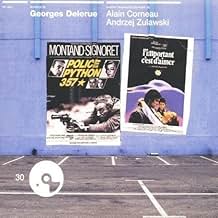Servais Mont conoce a Nadine Chevalier, quien gana su dinero protagonizando películas baratas.Servais Mont conoce a Nadine Chevalier, quien gana su dinero protagonizando películas baratas.Servais Mont conoce a Nadine Chevalier, quien gana su dinero protagonizando películas baratas.
- Dirección
- Guionistas
- Elenco
- Premios
- 2 premios ganados y 3 nominaciones en total
Henri Coutet
- Le père de Jacques
- (escenas eliminadas)
Andrée Tainsy
- La mère de Jacques
- (escenas eliminadas)
- (as Andree Tainsy)
Robert Dadiès
- Le médecin à l'hôpital
- (as Robert Dadies)
- …
Opiniones destacadas
A simple story about an actress, her sentimental dilemma , dark atmosphere and one of the most powerful roles of Romy Schneider. In same measure, a dark exploration of compromisses , limits of intense love and pure addiction, Fabio Testi reminding a young Andrei Batalov and offering fair portrait of vulnerable young photographer, under pressure of parent, friend, protectors and the woman who he loves and her, brilliant acted by Dutronc, husband.
A great film , gloomy, bitter but pure honest , proposing not exactly pleasant ways but the truths defining, in its basic dates, its essence.
In short, not comfortable, near bizarre but fascinating for the precise images of vulnerability .
A great film , gloomy, bitter but pure honest , proposing not exactly pleasant ways but the truths defining, in its basic dates, its essence.
In short, not comfortable, near bizarre but fascinating for the precise images of vulnerability .
This is a film for manic-depressives or people on amphetamines, maybe. I have rarely seen such frenetic activity outside of martial-arts pictures, yet the story is simple: a woman tires of her limp husband (Dutronc)and tries to start up with a much more masculine type (Testi). The milieu is the porn movie business which Schneider's character works in, interwoven with the classical theatre world she would like to belong to.
Romy Schneider got the Cesar award for her performance here; she pulls out all the stops to create this gifted but battered-by-life character. Pity that Zulawski couldn't craft a more balanced film around her.
Romy Schneider got the Cesar award for her performance here; she pulls out all the stops to create this gifted but battered-by-life character. Pity that Zulawski couldn't craft a more balanced film around her.
Hardly anything witty about love has dawned on Zulawski's third feature, an almost exclusively chamber drama, where a burgeoning attraction between a pornography photographer Servais Mont (Testi) and a second-rate actress Nadine Chevalier (Schneider), has barely taken off from the platonic struggle, because Nadine is married to Jacques (Dutronc), to whom she bears a tangible fusion of gratitude, responsibility and affection, which complicates their situation into a torrid emotional abyss so as to testify that love is indeed the most inscrutable, unpredictable, yet the most important thing.
Crammed in the high-ceiling, antique-looking Parisian apartments and loci like theatre, bar and hospital, its mise-en-scène strains to stay claustrophobic, fluid and quivering, signals the characters' shaky states, but, Zulawski and the screenwriter Christopher Frank fail to let their emotions run the full gamut to reach out its dazzled viewers, a stately but shallowly anaemic Testi cannot portray a role, whose inner depth is apparently out of his league, fumbles and routinely daydreams from scene to scene, his fervent gaze can not justify Servais' actions, his thoughts, and the limp dialogue doesn't help either.
Ms. Schneider, won Best Actress in the first-ever César Awards, is palpably more tapped into her role, sending off her raw charisma into her inwardly paralysed psyche, she tries to be frank with her own feelings, desire, dignity and pride at her own peril, but there are too many smoke and mirrors around to indulgently mystify an uncompounded, and fragmented story-line, the only thing to ameliorate the faint exasperation is when the pure dramatic sequences take the stage: Kinski's spit-fire flare-up is a mood-enforcer, Dutronc stands out in his chummy whims and delightfully erratic behavioural conundrum, a peculiar man who withdraws into a reprieve from, in an obvious tenor, a husband's functionality (abruptly falls into slumber so that his wife can only hopelessly play with herself to slake her desire), but also hatches up something seemingly unspeakable and inexplicable with Servais through an undertone of self-abandonment and total capitulation, in a muscle-versus-quirk contest over the same woman.
Zulawski's highbrow ambition to extract something refine and sophisticated out of the triangular deadlock doesn't consummately do the trick, in the end, Servais has to pay his debt with his blood and internal bleeding, from a father figure Mazelli (Dauphin), in his case, love IS the most important thing, if he can endure all the pain both physically and mentally, to demonstrate his unconditional devotion.
Georges Delerue's score is ever so conspicuous whenever a close-up is zoomed in between Servais and Nadine, to cloyingly illustrate their passion, otherwise, it remains forbidding and sinister, circles around a pessimistic account of love, in its purest but strangely tepid manifestation.
Crammed in the high-ceiling, antique-looking Parisian apartments and loci like theatre, bar and hospital, its mise-en-scène strains to stay claustrophobic, fluid and quivering, signals the characters' shaky states, but, Zulawski and the screenwriter Christopher Frank fail to let their emotions run the full gamut to reach out its dazzled viewers, a stately but shallowly anaemic Testi cannot portray a role, whose inner depth is apparently out of his league, fumbles and routinely daydreams from scene to scene, his fervent gaze can not justify Servais' actions, his thoughts, and the limp dialogue doesn't help either.
Ms. Schneider, won Best Actress in the first-ever César Awards, is palpably more tapped into her role, sending off her raw charisma into her inwardly paralysed psyche, she tries to be frank with her own feelings, desire, dignity and pride at her own peril, but there are too many smoke and mirrors around to indulgently mystify an uncompounded, and fragmented story-line, the only thing to ameliorate the faint exasperation is when the pure dramatic sequences take the stage: Kinski's spit-fire flare-up is a mood-enforcer, Dutronc stands out in his chummy whims and delightfully erratic behavioural conundrum, a peculiar man who withdraws into a reprieve from, in an obvious tenor, a husband's functionality (abruptly falls into slumber so that his wife can only hopelessly play with herself to slake her desire), but also hatches up something seemingly unspeakable and inexplicable with Servais through an undertone of self-abandonment and total capitulation, in a muscle-versus-quirk contest over the same woman.
Zulawski's highbrow ambition to extract something refine and sophisticated out of the triangular deadlock doesn't consummately do the trick, in the end, Servais has to pay his debt with his blood and internal bleeding, from a father figure Mazelli (Dauphin), in his case, love IS the most important thing, if he can endure all the pain both physically and mentally, to demonstrate his unconditional devotion.
Georges Delerue's score is ever so conspicuous whenever a close-up is zoomed in between Servais and Nadine, to cloyingly illustrate their passion, otherwise, it remains forbidding and sinister, circles around a pessimistic account of love, in its purest but strangely tepid manifestation.
Beautiful movie of three persons seeking to live, love and survive... Romy Schneider's performance is stunning as a porn actress desperately in love with a man who doesn't wish to live anymore, and resisting the seduction of a photograph. The picture is pretty "intellectual", but not boring. Soundtrack is fabulous...A great 70's melodrama. And what a pleasure to see Kinski!
Must see.
Must see.
Servais ,a photographer (Fabio Testi) meets Nadine ( Romy Schneider), a B-list actress and he falls in love with her. He'll try with any cost to help her with her career.
The movie talks about love as a drug. Servais is in love with Nadine who is his drug. She means happiness and at the same time suffering to him. The film describes a very beautiful love story in a very cruel and dark environment . Movie has nothing to do with the usual American romantic movies. The spectators will see and understand the soul of the main characters.
The interpretations are amazing. Romy Schneider is a great actress and she is proving it again in this movie. The first five minutes of the film are outstanding. She doesn't need to talk , her face says everything !! The other actors give their best too.
Zulawski makes a very special film which has his stamp. He creates his own world based on how society is structured.
I think that L'important c'est d'aimer is a film that either you hate it or love it, there is no middle way. Although, it is a must see for every cinephile!!
¿Sabías que…?
- TriviaRomy Schneider considered this movie her best work.
- Citas
Jacques Chevalier: J'ai rêvé de toi. Tu me versais du Coca-Cola dans l'oreille... Une vilaine mort, croyez-moi !
- Versiones alternativasItalian video version excludes some violent and explicit erotic scenes and runs 105 min.
- ConexionesFeatured in La mano negra (1980)
Selecciones populares
Inicia sesión para calificar y agrega a la lista de videos para obtener recomendaciones personalizadas
- How long is That Most Important Thing: Love?Con tecnología de Alexa
Detalles
- Fecha de lanzamiento
- Países de origen
- Idioma
- También se conoce como
- That Most Important Thing: Love
- Locaciones de filmación
- Productoras
- Ver más créditos de la compañía en IMDbPro
Taquilla
- Total en EE. UU. y Canadá
- USD 19,120
- Fin de semana de estreno en EE. UU. y Canadá
- USD 5,370
- 16 jul 2017
- Total a nivel mundial
- USD 19,120
- Tiempo de ejecución
- 1h 49min(109 min)
- Mezcla de sonido
- Relación de aspecto
- 1.66 : 1
Contribuir a esta página
Sugiere una edición o agrega el contenido que falta


































